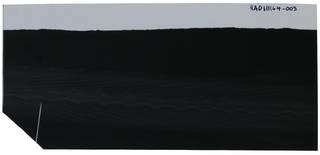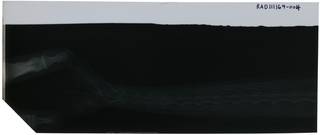WoRMS taxon details
Gempylus serpens Cuvier, 1829
126862 (urn:lsid:marinespecies.org:taxname:126862)
accepted
Species
Acinacea notha Bory de Saint-Vincent, 1804 · unaccepted
Gempylus coluber Cuvier, 1832 · unaccepted
Gempylus notha (Bory de St. Vincent, 1804) · unaccepted
Gempylus ophidianus Poey, 1860 · unaccepted
Lemnisoma thyrsitoides Lesson, 1831 · unaccepted
Muraena compressa Walbaum, 1792 · unaccepted (synonym)
marine, brackish, fresh, terrestrial
Cuvier, G. (1829). Le Règne Animal distribué, d'apres son organisation, pour servir de base à l'histoire naturelle des animaux et d'introduction à l'anatomie comparée. <em>Déterville, Paris.</em> Edition 2. v. 2: i-xv + 1-406., available online at https://www.biodiversitylibrary.org/page/31771348 [details]
Description Strictly oceanic, epipelagic and mesopelagic and occurring solitarily. Adults migrate to the surface at night while larvae...
Distribution Worldwide in tropical and subtropical seas; adults also often caught in temperate waters, as far north as 41°N
Description Strictly oceanic, epipelagic and mesopelagic and occurring solitarily. Adults migrate to the surface at night while larvae and juveniles stay near the surface only during the day. Feeds on fishes (myctophids, exocoetids, sauries, scombrids), crustaceans and cephalopods. Males mature at 43 cm SL, females at 50 cm. Spawns in tropical waters year round. Fecundity of about 300 thousand to 1 million eggs. No special fishery, but appears sometimes as by-catch in the tuna longline fishery (Ref. 9784). Not eaten raw, but cooked in any way, also dried (Ref. 7364). May also be sold as sausages and fish cake (Ref. 9302). [details]
Distribution Worldwide in tropical and subtropical seas; adults also often caught in temperate waters, as far north as 41°N
Distribution Worldwide in tropical and subtropical seas; adults also often caught in temperate waters, as far north as 41°N [details]
Froese, R. and D. Pauly. Editors. (2024). FishBase. Gempylus serpens Cuvier, 1829. Accessed through: World Register of Marine Species at: https://www.marinespecies.org/aphia.php?p=taxdetails&id=126862 on 2024-11-21
Date
action
by
![]() The webpage text is licensed under a Creative Commons Attribution-Noncommercial 4.0 License
The webpage text is licensed under a Creative Commons Attribution-Noncommercial 4.0 License
original description
Cuvier, G. (1829). Le Règne Animal distribué, d'apres son organisation, pour servir de base à l'histoire naturelle des animaux et d'introduction à l'anatomie comparée. <em>Déterville, Paris.</em> Edition 2. v. 2: i-xv + 1-406., available online at https://www.biodiversitylibrary.org/page/31771348 [details]
original description (of Muraena compressa Walbaum, 1792) Walbaum, J. J. (1792). Petri Artedi sueci genera piscium. In quibus systema totum ichthyologiae proponitur cum classibus, ordinibus, generum characteribus, specierum differentiis, observationibus plurimis. Redactis speciebus 242 ad genera 52. Ichthyologiae pars III. <em>Ant. Ferdin. Rose, Grypeswaldiae [Greifswald].</em> Part 3: [i-viii] + 1-723, Pls. 1-3.
page(s): 153 [details]
original description (of Gempylus coluber Cuvier, 1832) Cuvier, G. ; Valenciennes, A. (1832). Histoire naturelle des poissons. Tome huitième. Livre neuvième. Des Scombéroïdes. v. 8: i-xix + 5 pp. + 1-509, Pls. 209-245. [Cuvier authored pp. 1-470; Valenciennes 471-509. Date of 1831 on title page. i-xv + 1-375 in Strasbourg edition.].
page(s): 211, Pl. 221 [details]
context source (Deepsea) Intergovernmental Oceanographic Commission (IOC) of UNESCO. The Ocean Biogeographic Information System (OBIS), available online at http://www.iobis.org/ [details]
context source (Bermuda) Smith-Vaniz, W. F.; Collette, B. B.; Luckhurst, B. E (1999). Fishes of Bermuda: History, zoogeography, annotated checklist, and identification keys (American Society of Ichthyologists and Herpetologists - Special Publication No.4) . ASIH, 424 pp. [details]
context source (PeRMS) Chirichigno, N.; Cornejo, M. (2001). Catálogo comentado de los peces marinos del Perú. <em>2ª ed. Instituto del Mar de Perú. Publicación Especial. Callao.</em> 314 p. [details]
basis of record van der Land, J.; Costello, M.J.; Zavodnik, D.; Santos, R.S.; Porteiro, F.M.; Bailly, N.; Eschmeyer, W.N.; Froese, R. (2001). Pisces, <B><I>in</I></B>: Costello, M.J. <i>et al.</i> (Ed.) (2001). <i>European register of marine species: a check-list of the marine species in Europe and a bibliography of guides to their identification. Collection Patrimoines Naturels,</i> 50: pp. 357-374 (look up in IMIS) [details]
additional source Gulf of Maine Biogeographic Information System (GMBIS) Electronic Atlas. 2002. November, 2002. [details]
additional source King, C.M.; Roberts, C.D.; Bell, B.D.; Fordyce, R.E.; Nicoll, R.S.; Worthy, T.H.; Paulin, C.D.; Hitchmough, R.A.; Keyes, I.W.; Baker, A.N.; Stewart, A.L.; Hiller, N.; McDowall, R.M.; Holdaway, R.N.; McPhee, R.P.; Schwarzhans, W.W.; Tennyson, A.J.D.; Rust, S.; Macadie, I. (2009). Phylum Chordata: lancelets, fishes, amphibians, reptiles, birds, mammals. <em>in: Gordon, D.P. (Ed.) (2009). New Zealand inventory of biodiversity: 1. Kingdom Animalia: Radiata, Lophotrochozoa, Deuterostomia.</em> pp. 431-554. [details]
additional source McEachran, J. D. (2009). Fishes (Vertebrata: Pisces) of the Gulf of Mexico, Pp. 1223–1316 in: Felder, D.L. and D.K. Camp (eds.), Gulf of Mexico–Origins, Waters, and Biota. Biodiversity. Texas A&M Press, College Station, Texas. [details]
additional source Liu, J.Y. [Ruiyu] (ed.). (2008). Checklist of marine biota of China seas. <em>China Science Press.</em> 1267 pp. (look up in IMIS) [details] Available for editors [request]
[request]
additional source Froese, R. & D. Pauly (Editors). (2024). FishBase. World Wide Web electronic publication. version (06/2024)., available online at https://www.fishbase.org [details]
ecology source Looby, A.; Erbe, C.; Bravo, S.; Cox, K.; Davies, H. L.; Di Iorio, L.; Jézéquel, Y.; Juanes, F.; Martin, C. W.; Mooney, T. A.; Radford, C.; Reynolds, L. K.; Rice, A. N.; Riera, A.; Rountree, R.; Spriel, B.; Stanley, J.; Vela, S.; Parsons, M. J. G. (2023). Global inventory of species categorized by known underwater sonifery. <em>Scientific Data.</em> 10(1). (look up in IMIS), available online at https://doi.org/10.1038/s41597-023-02745-4 [details]
original description (of Muraena compressa Walbaum, 1792) Walbaum, J. J. (1792). Petri Artedi sueci genera piscium. In quibus systema totum ichthyologiae proponitur cum classibus, ordinibus, generum characteribus, specierum differentiis, observationibus plurimis. Redactis speciebus 242 ad genera 52. Ichthyologiae pars III. <em>Ant. Ferdin. Rose, Grypeswaldiae [Greifswald].</em> Part 3: [i-viii] + 1-723, Pls. 1-3.
page(s): 153 [details]
original description (of Gempylus coluber Cuvier, 1832) Cuvier, G. ; Valenciennes, A. (1832). Histoire naturelle des poissons. Tome huitième. Livre neuvième. Des Scombéroïdes. v. 8: i-xix + 5 pp. + 1-509, Pls. 209-245. [Cuvier authored pp. 1-470; Valenciennes 471-509. Date of 1831 on title page. i-xv + 1-375 in Strasbourg edition.].
page(s): 211, Pl. 221 [details]
context source (Deepsea) Intergovernmental Oceanographic Commission (IOC) of UNESCO. The Ocean Biogeographic Information System (OBIS), available online at http://www.iobis.org/ [details]
context source (Bermuda) Smith-Vaniz, W. F.; Collette, B. B.; Luckhurst, B. E (1999). Fishes of Bermuda: History, zoogeography, annotated checklist, and identification keys (American Society of Ichthyologists and Herpetologists - Special Publication No.4) . ASIH, 424 pp. [details]
context source (PeRMS) Chirichigno, N.; Cornejo, M. (2001). Catálogo comentado de los peces marinos del Perú. <em>2ª ed. Instituto del Mar de Perú. Publicación Especial. Callao.</em> 314 p. [details]
basis of record van der Land, J.; Costello, M.J.; Zavodnik, D.; Santos, R.S.; Porteiro, F.M.; Bailly, N.; Eschmeyer, W.N.; Froese, R. (2001). Pisces, <B><I>in</I></B>: Costello, M.J. <i>et al.</i> (Ed.) (2001). <i>European register of marine species: a check-list of the marine species in Europe and a bibliography of guides to their identification. Collection Patrimoines Naturels,</i> 50: pp. 357-374 (look up in IMIS) [details]
additional source Gulf of Maine Biogeographic Information System (GMBIS) Electronic Atlas. 2002. November, 2002. [details]
additional source King, C.M.; Roberts, C.D.; Bell, B.D.; Fordyce, R.E.; Nicoll, R.S.; Worthy, T.H.; Paulin, C.D.; Hitchmough, R.A.; Keyes, I.W.; Baker, A.N.; Stewart, A.L.; Hiller, N.; McDowall, R.M.; Holdaway, R.N.; McPhee, R.P.; Schwarzhans, W.W.; Tennyson, A.J.D.; Rust, S.; Macadie, I. (2009). Phylum Chordata: lancelets, fishes, amphibians, reptiles, birds, mammals. <em>in: Gordon, D.P. (Ed.) (2009). New Zealand inventory of biodiversity: 1. Kingdom Animalia: Radiata, Lophotrochozoa, Deuterostomia.</em> pp. 431-554. [details]
additional source McEachran, J. D. (2009). Fishes (Vertebrata: Pisces) of the Gulf of Mexico, Pp. 1223–1316 in: Felder, D.L. and D.K. Camp (eds.), Gulf of Mexico–Origins, Waters, and Biota. Biodiversity. Texas A&M Press, College Station, Texas. [details]
additional source Liu, J.Y. [Ruiyu] (ed.). (2008). Checklist of marine biota of China seas. <em>China Science Press.</em> 1267 pp. (look up in IMIS) [details] Available for editors
additional source Froese, R. & D. Pauly (Editors). (2024). FishBase. World Wide Web electronic publication. version (06/2024)., available online at https://www.fishbase.org [details]
ecology source Looby, A.; Erbe, C.; Bravo, S.; Cox, K.; Davies, H. L.; Di Iorio, L.; Jézéquel, Y.; Juanes, F.; Martin, C. W.; Mooney, T. A.; Radford, C.; Reynolds, L. K.; Rice, A. N.; Riera, A.; Rountree, R.; Spriel, B.; Stanley, J.; Vela, S.; Parsons, M. J. G. (2023). Global inventory of species categorized by known underwater sonifery. <em>Scientific Data.</em> 10(1). (look up in IMIS), available online at https://doi.org/10.1038/s41597-023-02745-4 [details]
 Present
Present  Present in aphia/obis/gbif/idigbio
Present in aphia/obis/gbif/idigbio  Inaccurate
Inaccurate  Introduced: alien
Introduced: alien  Containing type locality
Containing type locality
Unreviewed
Description Strictly oceanic, epipelagic and mesopelagic and occurring solitarily. Adults migrate to the surface at night while larvae and juveniles stay near the surface only during the day. Feeds on fishes (myctophids, exocoetids, sauries, scombrids), crustaceans and cephalopods. Males mature at 43 cm SL, females at 50 cm. Spawns in tropical waters year round. Fecundity of about 300 thousand to 1 million eggs. No special fishery, but appears sometimes as by-catch in the tuna longline fishery (Ref. 9784). Not eaten raw, but cooked in any way, also dried (Ref. 7364). May also be sold as sausages and fish cake (Ref. 9302). [details]Diet Feeds on fishes, cephalopods and crustaceans [details]
Distribution Worldwide in tropical and subtropical seas; adults also often caught in temperate waters, as far north as 41°N [details]
Habitat Strictly oceanic and usually solitary. Adults migrate to the surface at night while larvae and juveniles are found near the surface during the day. [details]
Habitat nektonic [details]
Habitat Known from seamounts and knolls [details]
Importance Bait [details]
| Language | Name | |
|---|---|---|
| English | snake mackerel | [details] |
| Japanese | クロタチカマス | [details] |
| Russian | змеиная макрельЗмеевидный гемпилюс | [details] |
| Spanish | escolar de canal | [details] |
To Barcode of Life (52 barcodes)
To Biodiversity Heritage Library (10 publications) (from synonym Acinacea notha Bory de Saint-Vincent, 1804)
To Biodiversity Heritage Library (21 publications) (from synonym Lemnisoma thyrsitoides Lesson, 1831)
To Biodiversity Heritage Library (31 publications) (from synonym Gempylus coluber Cuvier, 1832)
To Biodiversity Heritage Library (8 publications) (from synonym Gempylus ophidianus Poey, 1860)
To Biodiversity Heritage Library (83 publications)
To Biological Information System for Marine Life (BISMaL)
To European Nucleotide Archive, ENA (Gempylus serpens)
To FishBase (from synonym Gempylus notha (Bory de St. Vincent, 1804))
To FishBase (from synonym Gempylus ophidianus Poey, 1860)
To FishBase (from synonym Acinacea notha Bory de Saint-Vincent, 1804)
To FishBase (from synonym Lemnisoma thyrsitoides Lesson, 1831)
To FishBase
To FishBase (from synonym Muraena compressa Walbaum, 1792)
To FishBase (from synonym Gempylus coluber Cuvier, 1832)
To FishBase images (Gempylus serpens, Cape Verde, by Cambraia Duarte, P.M.N. (c)ImagDOP)
To GenBank (63 nucleotides; 77 proteins)
To Global Biotic Interactions (GloBI)
To IUCN Red List (Least Concern)
To NMNH Extant Collection (Gempylus serpens RAD111164-003)
To PESI
To ITIS
To Biodiversity Heritage Library (10 publications) (from synonym Acinacea notha Bory de Saint-Vincent, 1804)
To Biodiversity Heritage Library (21 publications) (from synonym Lemnisoma thyrsitoides Lesson, 1831)
To Biodiversity Heritage Library (31 publications) (from synonym Gempylus coluber Cuvier, 1832)
To Biodiversity Heritage Library (8 publications) (from synonym Gempylus ophidianus Poey, 1860)
To Biodiversity Heritage Library (83 publications)
To Biological Information System for Marine Life (BISMaL)
To European Nucleotide Archive, ENA (Gempylus serpens)
To FishBase (from synonym Gempylus notha (Bory de St. Vincent, 1804))
To FishBase (from synonym Gempylus ophidianus Poey, 1860)
To FishBase (from synonym Acinacea notha Bory de Saint-Vincent, 1804)
To FishBase (from synonym Lemnisoma thyrsitoides Lesson, 1831)
To FishBase
To FishBase (from synonym Muraena compressa Walbaum, 1792)
To FishBase (from synonym Gempylus coluber Cuvier, 1832)
To FishBase images (Gempylus serpens, Cape Verde, by Cambraia Duarte, P.M.N. (c)ImagDOP)
To GenBank (63 nucleotides; 77 proteins)
To Global Biotic Interactions (GloBI)
To IUCN Red List (Least Concern)
To NMNH Extant Collection (Gempylus serpens RAD111164-003)
To PESI
To ITIS



